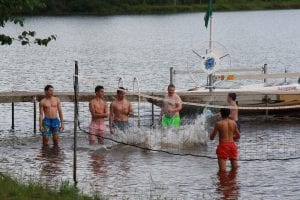Towering Pines Blog
Summer 2021: A Time to Dip Your Toes in the Socialization Pool
Author: Kim Aycock
After more than a year of quarantines, restrictions, isolation, reduced/weird social interactions, etc., we know that kids desperately need socialization with their peers. We are also aware there is a concern out there from students heading to any school that will be in-person next year (including college) that they will face almost full/constant socialization (classes, cafeterias, sports and other activities, buses, dorm rooms) and need to be “on” all the time after this past year of having almost zero socialization and being “off” all the time.
Those who are fortunate enough to go to camp in general, and this summer specifically, will be able to dip their toes in the socialization pool. They will get to practice interacting more regularly with peers before facing their next school year. This will be extremely beneficial for those kids who have had an especially isolating year at home and/or are facing a big transition next year. This could be going to a new school, whether because of regular advancement (middle to high school, for example), moving, or other life change.
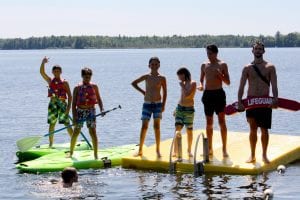
The good news is that this practice of interacting with peers will be a gradual process at Towering Pines this
summer. Campers will not be thrown into the deep end of the socialization pool without adjusting to shallow
water first. Because the first few days of camp will have us sticking to our cabin pods, this will allow a unique opportunity for campers to test the waters of a small group before diving in with the greater camp community
after our “bubble” has been established.
IT ALWAYS STARTS WITH THE CABIN GROUP (THEN AND NOW)
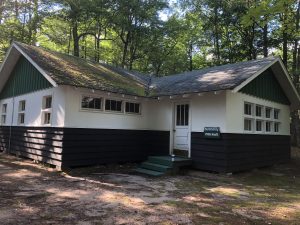 The cabin group at Towering Pines has always been one of thoughtful intention and purpose (even pre-pandemic). There are 2-3 counselors who will be carefully selected as a team to work with each age group. Together they establish the culture within the cabin so that campers feel welcome, comfortable and cared for. Individual boys come together to become one cabin family with a cabin name and flag which symbolizes their group unity. Their cabin will truly become their summer home, and they will take on roles and responsibilities that will foster growth within this family unit. Each camper will have “space” to make his own on a top or bottom bunk and designated places to store his “stuff”. The counselors will be ready to help campers navigate unpacking and settling in which is an important step for acclimating to their summer home.
The cabin group at Towering Pines has always been one of thoughtful intention and purpose (even pre-pandemic). There are 2-3 counselors who will be carefully selected as a team to work with each age group. Together they establish the culture within the cabin so that campers feel welcome, comfortable and cared for. Individual boys come together to become one cabin family with a cabin name and flag which symbolizes their group unity. Their cabin will truly become their summer home, and they will take on roles and responsibilities that will foster growth within this family unit. Each camper will have “space” to make his own on a top or bottom bunk and designated places to store his “stuff”. The counselors will be ready to help campers navigate unpacking and settling in which is an important step for acclimating to their summer home.
The counselors will be trained during their 2-week pre-camp orientation on group dynamics and will have a 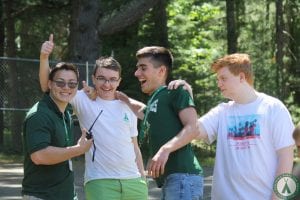 back pocket full of fun games and activities to start the process of evolving their cabin group (6-10 boys of similar age) into a community (a unified body of friends). This does not happen overnight, of course, but these intentional activities over time will help campers in the same cabin make introductions and connections, establish a code for group living, create a framework for communication, and provide opportunities for teamwork and trust.
back pocket full of fun games and activities to start the process of evolving their cabin group (6-10 boys of similar age) into a community (a unified body of friends). This does not happen overnight, of course, but these intentional activities over time will help campers in the same cabin make introductions and connections, establish a code for group living, create a framework for communication, and provide opportunities for teamwork and trust.
COMING TOGETHER IS A BEGINNING (TOES INTO THE WATER FIRST)
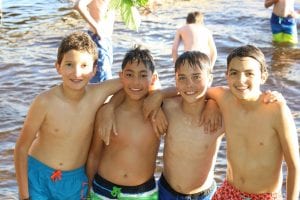 The initial few days for all cabin groups are a time for campers to get to know one another and adjust to their new environment. Both returning and new campers are eager to see what camp is about, to make friends, and to belong. Counselors will help campers make introductions and find connections with others in a nonthreatening way. Name games, ice-melters, and other get-to-know-you activities assist campers in discovering commonalities with each other at a surface level until the group is ready to share at a deeper level.
The initial few days for all cabin groups are a time for campers to get to know one another and adjust to their new environment. Both returning and new campers are eager to see what camp is about, to make friends, and to belong. Counselors will help campers make introductions and find connections with others in a nonthreatening way. Name games, ice-melters, and other get-to-know-you activities assist campers in discovering commonalities with each other at a surface level until the group is ready to share at a deeper level.
We find that campers often stick with what is comfortable and familiar at the beginning when getting involved 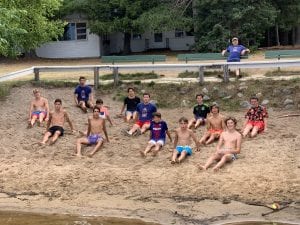 in the camp program (moving close to the water but not getting wet). This is perfectly OK. They will have the opportunity to branch out more as the summer unfolds and their comfort and confidence levels increase. The start of the camp season is the golden opportunity for counselors to set expectations and establish routines for cabin group meetings and discussions that will be the building blocks for future work and play together.
in the camp program (moving close to the water but not getting wet). This is perfectly OK. They will have the opportunity to branch out more as the summer unfolds and their comfort and confidence levels increase. The start of the camp season is the golden opportunity for counselors to set expectations and establish routines for cabin group meetings and discussions that will be the building blocks for future work and play together.
The fun of camp is just beginning – toes are being dipped into the socialization pool!
KEEPING TOGETHER IS PROGRESS (WADE IN A LITTLE FURTHER AND GET SPLASHED)
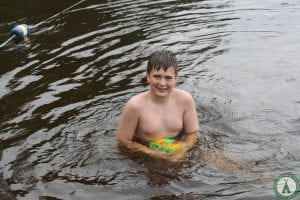 Once toes are wet and a foundation is in place, campers are ready to wade further into the water. Here we will gradually introduce mingling with others outside the cabin group for activities and other camp events. Campers will be eager to explore and try new things. Activities will be designed that allow them to do this in an age-appropriate way.
Once toes are wet and a foundation is in place, campers are ready to wade further into the water. Here we will gradually introduce mingling with others outside the cabin group for activities and other camp events. Campers will be eager to explore and try new things. Activities will be designed that allow them to do this in an age-appropriate way.
Campers may be ready to go beyond the surface and share on a 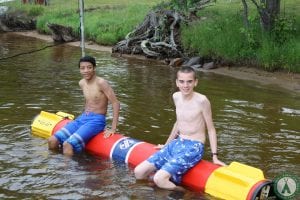 more meaningful level after spending quality time and having frequent interaction with their cabin group. Guidelines will be established by the counselors so that each person has a chance to participate equally and fairly. The important work of practicing communication skills will take place, especially sharing and listening, so the group is able to have a peaceful discussion when things aren’t going so well and to work through issues as they arise.
more meaningful level after spending quality time and having frequent interaction with their cabin group. Guidelines will be established by the counselors so that each person has a chance to participate equally and fairly. The important work of practicing communication skills will take place, especially sharing and listening, so the group is able to have a peaceful discussion when things aren’t going so well and to work through issues as they arise.
Camp is even more fun after wading in further and getting splashed a bit!
STAYING TOGETHER IS SUCCESS (DIVE IN DEEP)
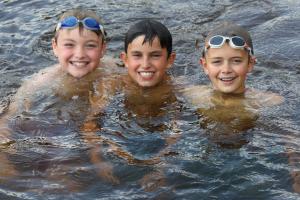 Once a group has experienced the success of moving past challenging times and is working well together, they will enjoy their cohesiveness and move into deeper water. Being in the “deep end” typically means that groups have the ability to communicate well, work as a team, and trust each other. Campers will exhibit confidence and independence and stand taller than they did at the beginning of their camp experience. (If you don’t believe me, look at camper photos at the beginning and end of a session — the change can be remarkable!)
Once a group has experienced the success of moving past challenging times and is working well together, they will enjoy their cohesiveness and move into deeper water. Being in the “deep end” typically means that groups have the ability to communicate well, work as a team, and trust each other. Campers will exhibit confidence and independence and stand taller than they did at the beginning of their camp experience. (If you don’t believe me, look at camper photos at the beginning and end of a session — the change can be remarkable!)
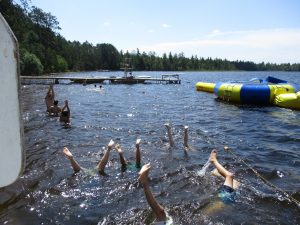 The best of each camper will combine to form a strong team, and it can be difficult for them to go their separate ways after taking this journey together. It is amazing how strong those bonds can be, especially when campers stay for a longer period of time, because of the growth that is made after reaching the other side of struggles and conflicts. This intentionality fosters the evolution of a group of campers into a unified community. Counselors will help campers put closure on their camp experience and transition to what comes next (returning to home and school).
The best of each camper will combine to form a strong team, and it can be difficult for them to go their separate ways after taking this journey together. It is amazing how strong those bonds can be, especially when campers stay for a longer period of time, because of the growth that is made after reaching the other side of struggles and conflicts. This intentionality fosters the evolution of a group of campers into a unified community. Counselors will help campers put closure on their camp experience and transition to what comes next (returning to home and school).
Camp is the most fun at the end because of taking a deep dive with the friends who are now family. Campers will have had lots of practice interacting with their peers over the course of the camp season and will leave with confidence to face the next school year!
Thank you to Liz Kunkle for suggesting this topic and giving examples of what kids will be facing in the months ahead (see first two paragraphs)!
Reference: acacamps.org/resource-library/camping-magazine/slinky-smurf-evolving-groups-communities
